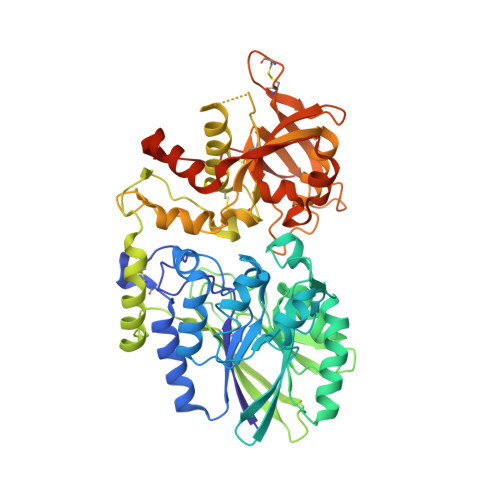Discovery of Potent and Selective Non-Nucleotide Small Molecule Inhibitors of CD73.
Beatty, J.W., Lindsey, E.A., Thomas-Tran, R., Debien, L., Mandal, D., Jeffrey, J.L., Tran, A.T., Fournier, J., Jacob, S.D., Yan, X., Drew, S.L., Ginn, E., Chen, A., Pham, A.T., Zhao, S., Jin, L., Young, S.W., Walker, N.P., Leleti, M.R., Moschutz, S., Strater, N., Powers, J.P., Lawson, K.V.(2020) J Med Chem 63: 3935-3955
- PubMed: 32212732
- DOI: https://doi.org/10.1021/acs.jmedchem.9b01713
- Primary Citation of Related Structures:
6XUE, 6XUG, 6XUQ - PubMed Abstract:
CD73 is an extracellular mediator of purinergic signaling. When upregulated in the tumor microenvironment, CD73 has been implicated in the inhibition of immune function through overproduction of adenosine. Traditional efforts to inhibit CD73 have involved antibody therapy or the development of small molecules, the most potent of which mimic the acidic and ionizable structure of the enzyme's natural substrate, adenosine 5'-monophosphate (AMP). Here, we report the systematic discovery of a novel class of non-nucleotide CD73 inhibitors that are more potent than all other nonphosphonate inhibitor classes reported to date. These efforts have culminated in the discovery of 4-({5-[4-fluoro-1-(2 H -indazol-6-yl)-1 H -1,2,3-benzotriazol-6-yl]-1 H -pyrazol-1-yl}methyl)benzonitrile ( 73 , IC 50 = 12 nM) and 4-({5-[4-chloro-1-(2 H -indazol-6-yl)-1 H -1,2,3-benzotriazol-6-yl]-1 H -pyrazol-1-yl}methyl)benzonitrile ( 74 , IC 50 = 19 nM). Cocrystallization of 74 with human CD73 demonstrates a competitive binding mode. These compounds show promise for the improvement of drug-like character via the attenuation of the acidity and low membrane permeability inherent to known nucleoside inhibitors of CD73.
- Arcus Biosciences, Inc., 3928 Point Eden Way, Hayward, California 94545, United States.
Organizational Affiliation:




















